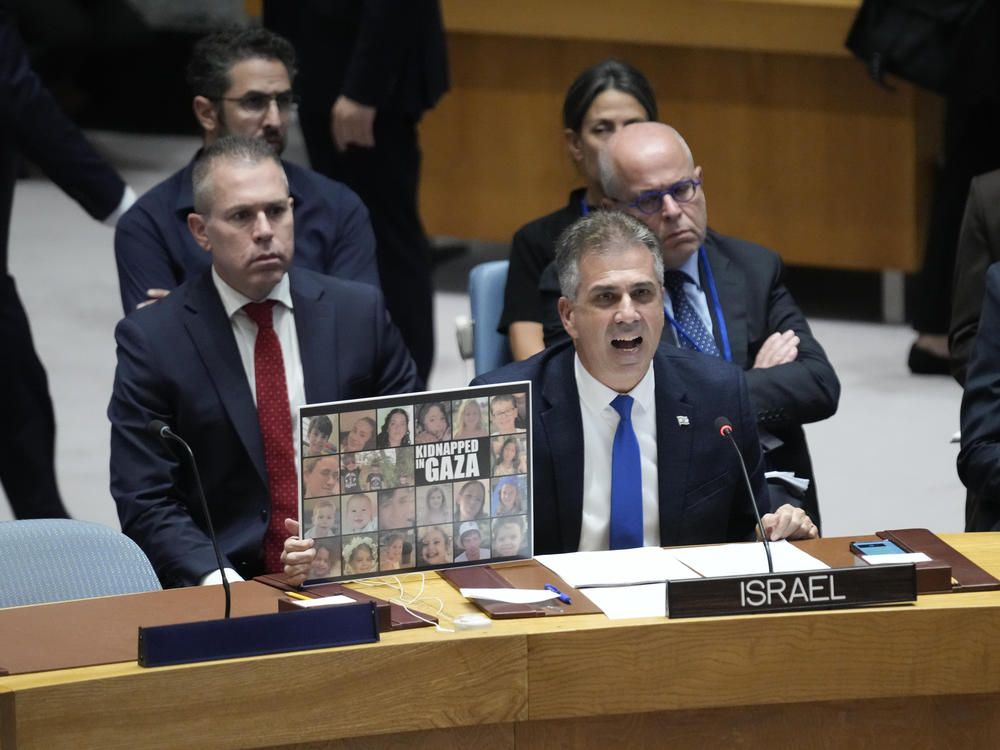Section Branding
Header Content
Diplomatic friction erupts at the U.N. as the crisis in Gaza deepens
Primary Content
Updated October 25, 2023 at 11:21 AM ET
For the latest updates on the Israel-Hamas conflict, follow NPR's digital live coverage.
United Nations Secretary-General António Guterres said he is "shocked" by the misrepresentation of comments he made Tuesday that offended Israeli leaders and sparked headlines worldwide.
The row started on Tuesday, during the U.N. Security Council meeting in New York that played out against the backdrop of deepening misery in Gaza.
During his opening remarks, Guterres said it was important to recognize that Hamas' Oct. 7 attack on Israel "did not happen in a vacuum" but came after decades of Palestinian resentment of Israeli occupation. But he also said those grievances could not justify the "appalling" attacks.
In response, Gilad Erdan, Israel's ambassador to the United Nations, called for Guterres' resignation, saying he is "not fit to lead the U.N." and called for the country to "reassess" its relations with the United Nations.
Erdan told Israeli media that the country would deny a visa to a U.N. humanitarian coordinator, saying it was time the body learned "a lesson."
Israel's foreign minister later canceled a meeting with Guterres, accusing him of victim blaming.
Addressing the media on Wednesday, Guterres said his comments had been taken "as if I was justifying acts of terror by Hamas," when in fact he was saying the opposite.
"I spoke of the grievances of the Palestinian people but I also stated that cannot justify the appalling attacks by Hamas," he stressed, adding "I believe it is necessary to the record straight — especially out of respect for the victims and their families."
In Guterres' speech Tuesday, he pleaded with other countries to step up humanitarian aid and to help ensure the conflict doesn't spread to other countries.
His pleas came as staggering numbers from the conflict emerged for another day: thousands dead, even more injured. Roughly 1.4 million people — 60% of Gaza's population — had left their homes, but remained trapped in the territory. Relief sites overflowed; at one, 400 people shared a single toilet. Hospitals designed for hundreds of patients found themselves treating thousands.
The World Health Organization said Tuesday that doctors have been performing surgeries without anesthesia or other basic surgical supplies.
"We are on our knees asking for sustained, scaled up, protected humanitarian operations," said Dr. Rick Brennan, emergencies director for the WHO Eastern Mediterranean Region.
Israeli officials say there are still 220 hostages being held in Gaza.
On Tuesday, the Israeli military dropped leaflets on Gaza urging Palestinians to contact them with information about the hostages, and promising a financial reward along with "maximum effort in providing security for you and your home."
World leaders and humanitarian groups have called on Hamas to release the remaining hostages unconditionally. The U.S. has reportedly advised Israel to delay its much-expected ground invasion of Gaza in order to facilitate the release of the remaining hostages.
It's still unclear when Israel will launch its ground invasion in Gaza, but the Israeli military is "ready and determined" for action, military spokesperson Daniel Hagari told Reuters on Tuesday.
NPR's Michele Kelemen and Emily Olson contributed reporting.
Copyright 2023 NPR. To see more, visit https://www.npr.org.

